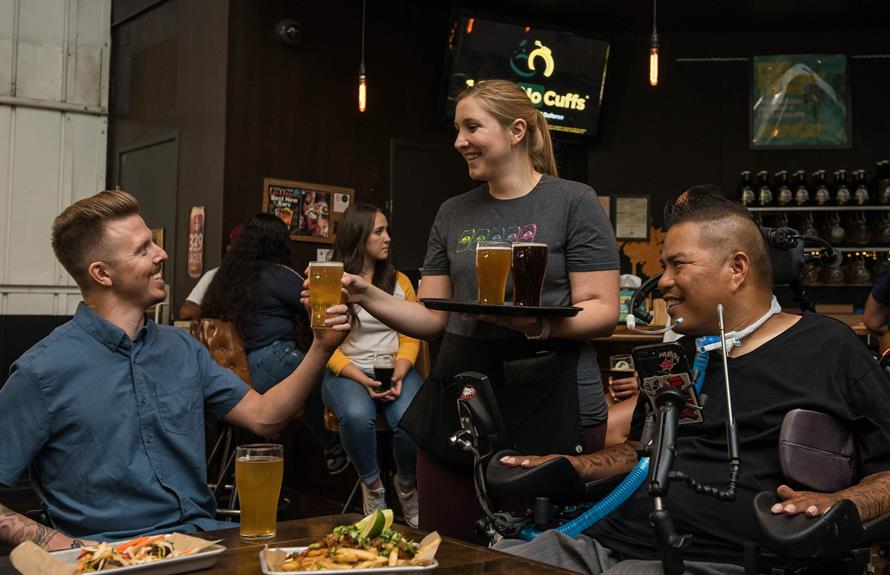Are you worried about the negative effects of alcohol on your brain? Look no further! We've got you covered with the 5 best ways to counter alcohol's brain impairment.
By incorporating exercise, maintaining a healthy diet, engaging in cognitive training, getting enough sleep, and seeking professional help and support, you can protect and improve your brain health.
Say goodbye to alcohol's damaging impact and hello to a sharper, healthier mind!
Exercise and Physical Activity
To counter alcohol's brain impairment, you should engage in regular exercise and physical activity. Research has shown that engaging in physical activity can have a positive impact on brain health and function. One effective way to incorporate exercise into your routine is through yoga and meditation. These activities not only provide physical benefits but also have been shown to reduce stress and improve cognitive function.
Yoga combines physical movements with focused breathing and meditation, which can help improve brain function and cognitive abilities. It promotes relaxation and reduces anxiety, both of which can be beneficial for counteracting alcohol's brain impairment. Additionally, outdoor activities such as hiking, running, or playing sports can also contribute to brain health. Being in nature and engaging in physical activity can have a calming and rejuvenating effect on the brain.
Regular exercise has been linked to increased blood flow to the brain, which can enhance cognitive abilities and improve memory. It also helps to stimulate the growth of new neurons, which can protect against the damaging effects of alcohol on the brain. Engaging in physical activity regularly can also improve mood and overall mental well-being, which can be beneficial in counteracting the negative effects of alcohol.
Healthy Diet and Nutrition
How can you ensure that your diet and nutrition support your efforts to counter alcohol's brain impairment?
Maintaining a healthy diet and proper nutrition is crucial in supporting your body's ability to recover from alcohol's negative effects on the brain. When it comes to alcohol detoxification, nutritional supplements can play a significant role in aiding the recovery process.
Certain nutrients are vital for brain health and can help repair the damage caused by excessive alcohol consumption. B vitamins, particularly thiamine (vitamin B1), are essential for cognitive function and can be depleted by alcohol. It's recommended to include foods rich in thiamine, such as whole grains, legumes, and lean meats, in your diet.
In addition to vitamins, minerals like magnesium, zinc, and selenium are also important for brain function and can be depleted by alcohol. Including foods like nuts, seeds, leafy greens, and seafood in your diet can help replenish these nutrients.
Furthermore, nutritional supplements can be beneficial in providing your body with the necessary vitamins, minerals, and antioxidants that support brain health. However, it's important to consult with a healthcare professional before starting any supplementation regimen.
Cognitive Training and Mental Stimulation
Engage in cognitive training and mental stimulation to further enhance your efforts in countering alcohol's brain impairment. By actively engaging your brain through various brain exercises and memory techniques, you can improve cognitive function and mitigate the negative effects of alcohol on your brain.
Here are three effective ways to incorporate cognitive training and mental stimulation into your routine:
- Brain exercises: Engaging in activities that challenge your brain can help improve cognitive function and enhance neural connections. Try puzzles, crosswords, sudoku, or brain-training apps to stimulate different areas of your brain and sharpen your cognitive skills.
- Memory techniques: Memory is often affected by alcohol consumption, but there are techniques you can use to improve it. Practice mnemonic devices, such as creating acronyms or visual associations, to help you remember important information. Additionally, maintaining a regular sleep schedule and getting enough rest can also boost memory retention.
- Learn something new: Engaging in new learning experiences can stimulate your brain and promote neuroplasticity. Take up a new hobby, learn a musical instrument, or explore a different language. These activities challenge your brain and create new neural connections, which can counteract alcohol's brain impairment.
Adequate Sleep and Rest
Get enough sleep and rest to effectively counter alcohol's brain impairment.
Adequate sleep is crucial for maintaining optimal brain function and overall well-being. When you consume alcohol, it can disrupt your sleep patterns and interfere with the quality of your rest. This can lead to cognitive impairments, such as difficulty concentrating and increased stress levels.
Research has shown that sleep plays a vital role in memory consolidation, learning, and attention. By ensuring you get enough sleep, you can counteract the negative effects of alcohol on your brain. During sleep, your brain processes and stores information, allowing you to improve your concentration and retain new knowledge.
Additionally, getting adequate rest can help reduce stress levels. Alcohol consumption can increase stress and anxiety, leading to further impairment of cognitive function. By prioritizing sleep and rest, you can give your brain the opportunity to recover and rejuvenate, reducing the impact of alcohol on your mental abilities.
To improve your sleep quality, establish a consistent sleep schedule, create a relaxing bedtime routine, and create a sleep-friendly environment. Avoiding alcohol before bedtime can also contribute to better sleep.
Seeking Professional Help and Support
To effectively counter alcohol's brain impairment, it's important to consider seeking professional help and support. Here are three ways in which you can do so:
- Join Support Groups: Support groups provide a safe and understanding environment for individuals struggling with alcohol-related issues. Being part of a support group allows you to connect with others who are going through similar challenges, share experiences, and gain valuable insights. These groups offer emotional support, encouragement, and guidance, helping you navigate your journey towards recovery.
- Attend Therapy Sessions: Therapy sessions with a trained professional can be incredibly beneficial in addressing the underlying causes of alcohol abuse and addressing the associated brain impairment. Therapists use evidence-based techniques to help you explore the root causes of your drinking, develop coping strategies, and make positive changes in your life. Through therapy, you can gain a deeper understanding of your relationship with alcohol and work towards healthier habits.
- Seek Professional Treatment Programs: In some cases, professional treatment programs may be necessary to overcome alcohol's brain impairment. These programs provide comprehensive care, including detoxification, medical supervision, counseling, and support. They offer a structured and supportive environment that can greatly increase your chances of successful recovery.
- Overcoming Emotional Intimacy Challenges With Alcohol Misuse - November 18, 2023
- Overcoming Alcohol's Impact on Emotional Intimacy: 13 Essential Tips - November 18, 2023
- 6 Ways to Overcome Emotional Intimacy Challenges With Alcohol - November 18, 2023








